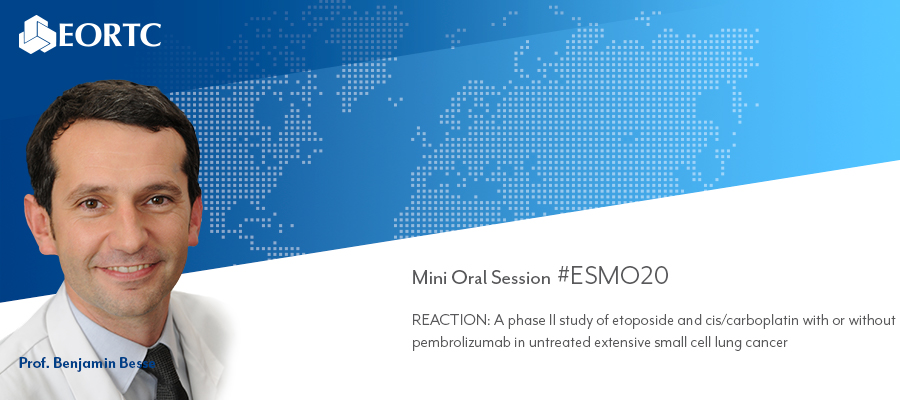New Data Gives Hope to Small Cell Lung Cancer Patients
18 Sep 2020
About 13% of lung cancer patients have Small Cell Lung Cancer (SCLC). The prognosis of this disease is very poor with 5-year survival rates of 31% for limited-stage SCLC (LS-SCLC) and 2% for extensive-stage SCLC (ES-SCLC). However, recent studies have shown that anti PD-L1 antibodies can extend overall survival of ES-SCLC patients when combined with platinum-etoposide treatment.
Professor Benjamin Besse, Head of the Cancer Medicine Department at Gustave Roussy Cancer Campus and Professor of Medical Oncology at Paris-Saclay University, Orsay, presented the late breaking data from EORTC-1417-LCG REACTION study: a phase II study of etoposide and cis/carboplatin with or without pembrolizumab in untreated extensive small cell lung cancer at the ESMO Virtual congress today.
All 125 patients (61 in experimental vs 64 in control arm) recruited previously responded to 2 cycles of platinum-etoposide. They were randomized into the control arm of 4 additional cycles of platinum-etoposide treatment or the experimental arm with 4 additional cycles of platinum-etoposide treatment combined with pembrolizumab and then up to 35 cycles of pembrolizumab. 119 (58 vs 61) patients were eligible and started at least one dose of the treatment. 19 patients had crossed over to the experimental arm at the time of progression. In the experimental arm, 43 % exhibited grade 3 to 5 adverse events vs 36% in the standard arm, median progression free survival was 4.7 vs. 5.4 months and overall survival was 12.3 vs 10.4 months respectively. Besse concluded that even though the combination of etoposide and platinum with pembrolizumab was well tolerated, it did not improve progression free survival compared to standard treatment. However, the data did elude to the potential increase in overall survival, it should be noted that pembrolizumab needs to be introduced as first line treatment in order to benefit from this improvement.
“In REACTION, immunotherapy was added from the third cycle of chemotherapy,” said Besse. “Our results confirm the benefit of adding immunotherapy to first line chemotherapy in patients with extended SCLC. Our strategy is interesting for patient with PS2 at cycle 1 (thus unfit for immunotherapy) that will improve to PS 1 or 0 at cycle 3”.
Reference:
Mini Oral Session – Non-metastatic NSCLC and other thoracic malignancies
LATE BREAKING ABSTRACT: REACTION: A phase II study of etoposide and cis/carboplatin with or without pembrolizumab in untreated extensive small cell lung cancer
- Presentation Number: LBA85
- Date: 18 September 2020
- Speaker: Benjamin Besse (Villejuif, CEDEX, France)
Related News
Meet the new EORTC Board
9 Jul 2024
We are pleased to announce the release of the EORTC 2023 Annual Report
17 Jun 2024
Dr Denis Lacombe, EORTC CEO, appointed stakeholder co-chair of ACT EU advisory group
24 May 2024
Clinical Trials Day 2024: a Q&A on pragmatic clinical trials
20 May 2024
EORTC/EMA workshop suggests an international way forward for treatment optimisation studies
8 May 2024
EORTC’s Participation at the ESTRO Congress 2024
29 Apr 2024
EORTC: Advancing research and treatment for rare cancers
29 Feb 2024
EORTC Fellowship Programme: celebrating more than 20 years of impactful collaboration
22 Feb 2024
Appointment of Malte Peters as EORTC Strategic Alliance Officer
9 Feb 2024
Unique series of workshops in partnership with the European Medicines Agency (EMA)
7 Feb 2024


